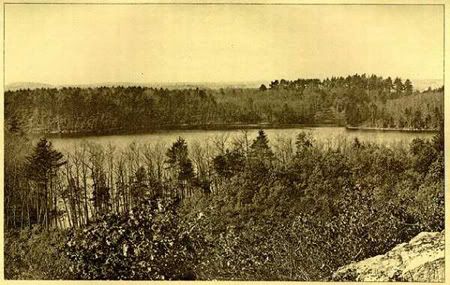WALDEN: A Short Consideration of Location, Location, Location
The Classics Reading Challenge hosted by November’s Autumn is the one I’m calling “Classics with a Twist” – the twist being that on the fourth of each month, Katherine posts a prompt to act as a basis for my discussion of the classic I’m currently reading.
This month, the prompt is LOCATION – and the classic I’ve most recently finished is Walden by Henry David Thoreau.
In 1845, Thoreau spent two years living in a small cabin in the woods near Walden Pond, Connecticut Massachusetts. (oops! See comments.) In his classic discourse, Walden, the author discusses in some depth the economic theory behind his experiment in living, as well as minute observations about nature, including the pond itself.
After the introductory essays, Thoreau doesn’t so much introduce the location, as he does analyze it throughout the book. In fact, location seems inseparable to the book. It is, after all, called Walden.

This is how Walden Pond looked about the time Thoreau lived there. It would have been nicer to see this in summer when there were leaves on the trees – that is how I imagined it even though Thoreau talks in depth about winter and spring at the pond.
Would the book have worked as well if Walden had been located somewhere else? The southern US? Above the Arctic Circle? The Australian outback? Surprisingly (to me, once I started considering this), I think the basic premise of the book – which was Thoreau’s experiment in opting out of established society – would be as strong no matter where it was set. Certainly, the description of the changing seasons would have been replaced by other observations of the natural cycles.
What do you think? Is Walden Pond inseparable from the book Walden?


I suspect the differences would have been largely incidental. But I also suspect that Thoreau’s experience would have been far less paradisaical if he’d set up camp in South Texas.
Yes, Bonnie – paradise would have to have changing seasons!
I haven’t read Thoreau yet but I’ve, of course, heard great things. 🙂 And love his connection with the Alcotts.
Thank you for your post, Debbie!
The thing that always tickled me about Walden was that Thoreau was within a short walk of his pal Emerson’s house and he went there often while living at Walden Pond. Emerson’s wife was a good cook! As for your question, I think it could have been anywhere in New England, but no other part of the country.
Barbara, Walden was so full of contradictions of which that is only one: “I opt out, but not out of Mrs. Emerson’s cooking” lol
It’s Massachusetts not Connecticut. :<) It wouldn't have worked anywhere else because that's where the whole circle lived, those people that Susan Cheever calls 'American Bloomsbury' in her book of that name. A brilliant book, by the way.
Oh, Nan, is my face red! Shows you just how good both my American geography AND my memory are!
I agree with you. I think Thoreau was an excellent writer and would have made the essay work wherever he set it. But I’m so very glad he chose Walden Pond. (I definitely picture it in winter.) 🙂
There is certainly something idyllic about New England, Jillian!
I downloaded Walden on my nook a while back, but haven’t read it yet. I want to, but so many other books have come my way. I think I might start it today. It can go with all the other books I *need* to read 🙂 I love memoirs about going back to the land though, so I am sure this will be a quick read!
I hope Walden is a quick read for you, Heather. It’s not all back to the land and I found it a hard slog.
Walden is a book I’ve wanted to read for a while. It seems to me that the location has to be essential – Walden set anywhere else, wouldn’t be Walden, although I know what you mean about the basic premise of the book – opting out of society could take place somewhere else.
I’m still of mixed feelings on the matter, Margaret. Walden was an ideal setting, though!